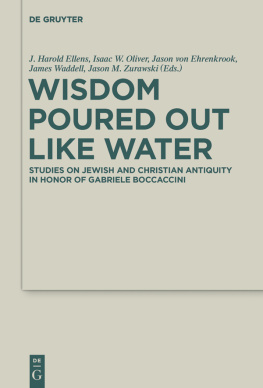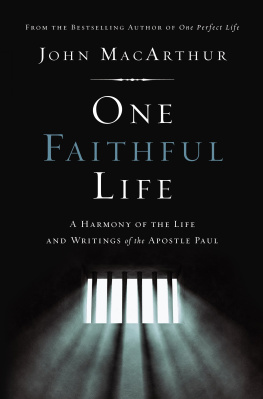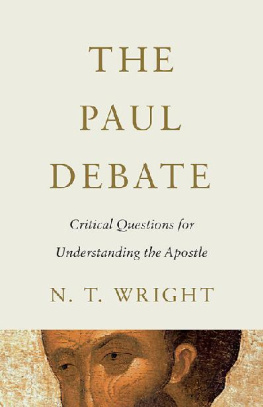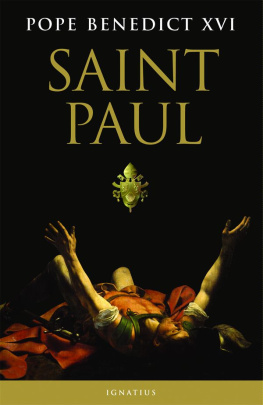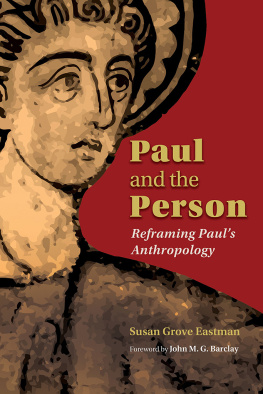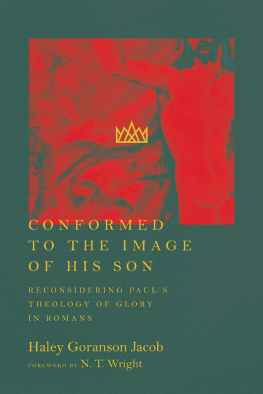

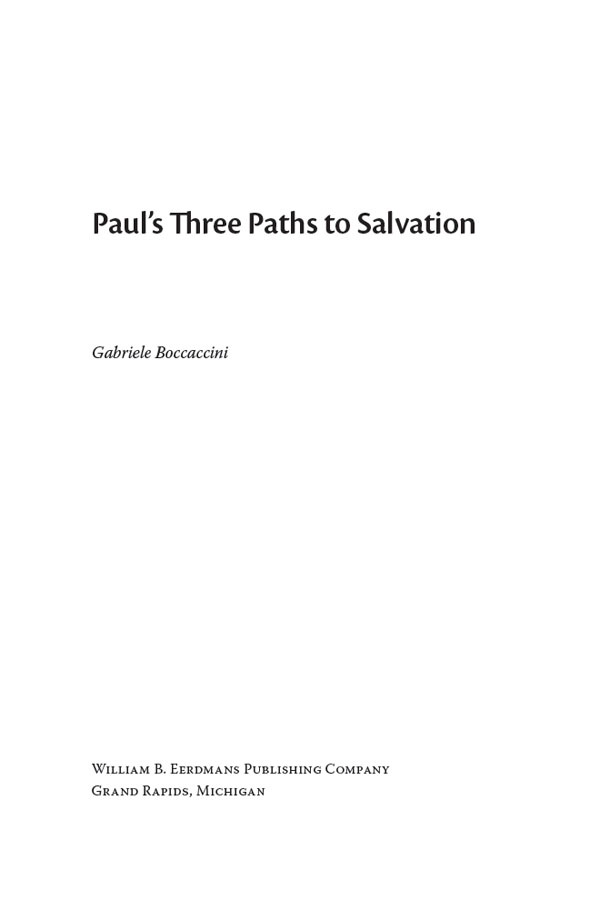
Wm. B. Eerdmans Publishing Co.
4035 Park East Court SE, Grand Rapids, Michigan 49546
www.eerdmans.com
2020 Gabriele Boccaccini
All rights reserved
Published 2020
Printed in the United States of America
26 25 24 23 22 21 20 1 2 3 4 5 6 7
ISBN 978-0-8028-3921-3
Library of Congress Cataloging-in-Publication Data
Names: Boccaccini, Gabriele, 1958 author.
Title: Pauls three paths to salvation / Gabriele Boccaccini.
Description: Grand Rapids, Michigan : William B. Eerdmans Publishing Company, 2020. | Includes bibliographical references and index. | Summary: A historical argument that Pauls teachings suggest three different methods of salvationProvided by publisher.
Identifiers: LCCN 2020013214 | ISBN 9780802839213 (hardcover)
Subjects: LCSH: Bible. Epistles of Paul--Theology. | SalvationBiblical teaching.
Classification: LCC BS2655.S25 B63 2020 | DDC 234dc23
LC record available at https://lccn.loc.gov/2020013214
Unless otherwise indicated, all Scripture quotations are from New Revised Standard Version Bible, copyright 1989
National Council of the Churches of Christ in the United States of America. Used by permission. All rights reserved worldwide.
For Aloma
CONTENTS
FOREWORD
It hardly needs to be said that no figure in Christian history, with the exception of Jesus himself, has been of greater consequence for the tradition than Paul. The whole of Christian dogmatic and systematic theology either grows directly out of his epistles or is inflected through them. And yet no other figure in Christian history has suffered greater or more grievous misrepresentations by his putative followers. In part, this is attributable to an undeniable and fairly frequent obscurity in Pauls way of expressing himself; he was, as even his most devoted readers should be willing to admit, a careless writer. His style was almost invariably precipitate, fragmentary, syntactically vagranteven sprawling. This is not to deny that there is also a very real eloquence in his prose, at times almost exquisite; but it is an eloquence born from passion rather than from literary refinement or dialectical precision. As often as not, the reader is not so much led on by the clarity and rigor of his arguments as carried along by the visionary intensity of his voice. That said, the far greater cause of the misunderstandings that have bedeviled Pauls posterity has been a loss of contextcultural, religious, linguistic, and philosophical. Paul lived and wrote as a faithful Jew in a first-century world, within the context of a Judaism that was both Semitic and Graeco-Roman, that had absorbed influences from the Persian and Greek intellectual worlds, and that had not yet fully evolved the rabbinic traditions of later centuries. He thought in categories at once eminently Jewish and pervasively Hellenistic, but also apocalyptic, messianic, metaphysical, and prophetic; and the Second Temple Judaism in which he had been reared was far more religiously diverse and intellectually heterogeneous than most of us today are likely to appreciate. But, by the time Augustines fully elaborated Pauline synthesis of Christian thought took shape, Pauls readers were living in a Christian context, one in which much of the intellectual and spiritual world that Paul had known had vanished, and in which even the schools of Judaism that were still active were little understood.
This was especially true in the Christian West, wherein addition to all the other obstacles that made a proper reading of Paul difficultthere was the barrier of language.
Augustine, for instancethe greatest of the Latin fathers, among the greatest minds of Christian history, and one of the first truly systematic interpreters of Paul in theological historywas separated from Pauls world not only by his ignorance of apocalyptic Judaism in the first century, or of the angelology and demonology of the Second Temple Noachian
books, or of countless other things that were essential to the apostles vision of reality, but also by an inability to read Greek. In the end, for all his genius, Augustine more or less invented a Paul who never truly existed and then bequeathed him to later generations of Western believers. In the works of his late period in particular, Augustine (guilelessly but nonetheless disastrously) took Pauls claim that it is not ritual observances like circumcision and kosher dietary laws that place humans in a just or righteous relation to God and converted it into the very different claim that human beings are wholly impotent to please
God through works or deeds of any kind (including works of moral righteousness). He also made Pauls authentic description of humanity as a family born in slavery to sin and death more or less interchangeable with an entirely spurious discourse regarding humanitys inherited culpability as a single massa damnata. Moreover, whether or not he was the first theologian illegitimately to conflate the ideas of justification and salvation in Pauls thought, he was certainly the most influential to do so. And he, more than any other theologian in Christian history, was responsible for turning Pauls quite explicit teaching that human beings will be judged by God according to their works into an elliptical and willfully opaque teaching that, on the day of judgment, God will merely crown his own merits in those souls to which he has imparted them by the sheer grace of unmerited election.
This is the Paul who dominated Western Christian thought throughout most of its centuries, whether gladly accepted or partially resisted by ecclesiastical authority and theologians. It is the Paul of Prosper of Aquitaine and Fulgentius Ruspensis, as well as of (in a more controversial and extreme expression) Gottschalk; it is also the Paul of the early modern periodof Luther, and Calvin and Jansen, as well as of the baroque Thomists. And it is the Paul, alsomost tragically of allof certain persistent Christian denigrations and caricatures of Judaism. Whereas the Paul of the epistles was a Jew who saw the gospel as taking away the wall of division between the true children of the covenant and gentiles, so that all might receive Gods forgiveness and live in righteousness, this mythological Paul was a Christian who had rejected the legalism and works righteousness of Judaism. Even those modern, revisionist readings of Paul that have so vastly improved on this picture (that of E. P. Sanders perhaps most epochally) have still tended to preserve aspects of some of its more reductive treatments of an antithesis between law and gospel. Even many scholars who have striven to locate Paul more firmly in a Jewish cultural context and Jewish theological idiom have tended in the process to invent a Christianized picture of first-century Judaisma kind of Protestantism without Jesusconcocted from a mixture of the late prophets and much later rabbinic traditions, and purged of Second Temple apocalyptic ideas and of all foreign influences (Persian, Hellenistic, and so forth).
And, in a sense, that is very much where todays Western Christian tends to stand. Ask, for instance, the average American Christiansay, some genial Presbyterian who attends church regularly and owns a New International Version of the Biblewhat gospel the apostle Paul preached. The reply will usually fall along predictable lines: Human beings, bearing the guilt of original sin and destined for eternal hell, cannot save themselves through good deeds, or make themselves acceptable to God; yet God, in his mercy, sent the eternal Son to offer himself up for our sins, and now the righteousness of Christ has been graciously imputed or imparted to all who have faith; though, even then, this company of the faithful comprises only those whom God, in his inscrutable counsels and without any regard to prevision of their merits or demerits, sovereignly elects for the gratuitous gift of salvation, while consigning the rest of humanity to a condign eternal torment. Some details might vary, but not the basic story. And, admittedly, some of the tales language is reminiscent of terms used by Paul, at least as filtered through certain conventional translations; but much of it is a fantasy. For one
Next page

